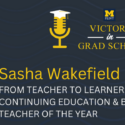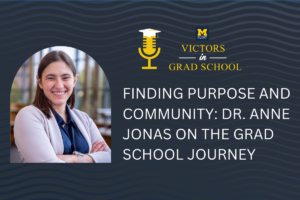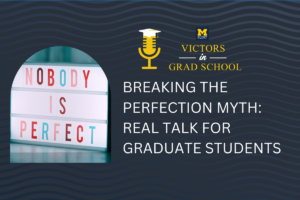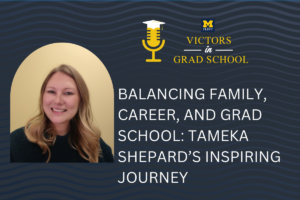Embarking on the journey of graduate education is a significant milestone in one’s life. It is a pathway filled with self-exploration, knowledge acquisition, and transformation. In the podcast episode featuring Sasha Wakefield, a high school math teacher from Clio, Michigan, her story reflects the essence of this transformative journey. With a passion for learning and a drive for success, Sasha shares insights from her educational pursuits, offering valuable lessons for aspiring graduate students.
Discovering the Desire for Education
Sasha’s educational journey began with overcoming challenges early on in her life. As a teen mother facing uncertainties, she found her determination to pursue higher education. Starting at Mott Community College and later transferring to Ferris State University, Sasha’s thirst for knowledge led her to a career in teaching. Her story exemplifies resilience and the power of pursuing one’s dreams despite obstacles.
Choosing the Path: Master’s Degree and Beyond
Sasha’s decision to further her education by pursuing a master’s degree at Concordia University was driven by a combination of factors. Financial considerations, program offerings, and a passion for mathematics education influenced her choice. Her dedication to paying off her student loans and gaining specialized knowledge in curriculum instruction showcased her commitment to professional growth.
Exploring Educational Leadership
Transitioning to an Educational Specialist Degree at the University of Michigan Flint, Sasha delved into educational leadership, broadening her perspective on the public education system. With aspirations to enhance her role as an educator and leader within the school community, Sasha embraced the opportunity to gain insights into administrative functions and community partnerships. Her choice to continue her education at UM Flint reflects her positive experiences and strong connection to the institution.
Balancing Passion and Profession
Sasha’s success in her educational pursuits stems from her unwavering passion for teaching. Viewing education as a source of happiness and fulfillment, she emphasizes the importance of wholehearted commitment to one’s goals. Sasha’s dedication to continuous learning and improvement not only enriches her teaching practice but also inspires her students to discover their own passions and pursue them with vigor.
Impact of Graduate Education on Teaching
The knowledge and skills acquired through Sasha’s master’s and specialist degrees have greatly influenced her teaching practice. By integrating leadership perspectives and community engagement strategies, she has gained a deeper understanding of the education system’s complexity. Through continuous reflection and application of her learning, Sasha has become a more effective educator, dedicated to enhancing student achievement and fostering a supportive learning environment.
Celebrating Success: Michigan Teacher of the Year Finalist
Sasha’s recognition as a finalist for the Michigan Teacher of the Year Award stands as a testament to her dedication and exemplary work in the field of education. Her journey of hard work, resilience, and relentless pursuit of excellence serves as an inspiration to her students and colleagues. The accolade not only validates Sasha’s commitment to education but also highlights her impact as a role model within the educational community.
Embracing the Graduate School Journey
Sasha’s story encapsulates the essence of embarking on a graduate school journey with passion and purpose. Her experiences underscore the importance of following one’s passions, embracing challenges, and committing wholeheartedly to personal and professional growth. Aspiring graduate students can glean valuable lessons from Sasha’s journey, finding inspiration to navigate their own educational paths with determination and enthusiasm.
Sasha Wakefield’s narrative exemplifies the transformative power of education and the unwavering dedication required to succeed in the field of teaching. Her journey serves as a beacon of inspiration for individuals embarking on their own graduate education pursuits, illuminating the path towards personal and professional fulfillment. By embracing the journey with passion and perseverance, one can overcome obstacles, achieve milestones, and make a lasting impact in the realm of education.
TRANSCRIPT
Dr. Christopher Lewis [00:00:01]:
Welcome to the victors in grad school, where we have conversations with students, alumni, and experts about what it takes to find success in graduate school.
Dr. Christopher Lewis [00:00:11]:
Welcome back to victors in grad school. I’m your host, doctor Christopher Lewis, director of graduate programs at the University of Michigan, Flint. I’m really excited to have you back again this week. Every week, I love being able to walk with you on this journey that you’re on. And I call it a journey because it truly is a journey. Every person going to graduate school, every person thinking about graduate school is going to be going on a true journey, a journey of self exploration, a journey of knowledge acquisition, a journey in so many different ways that will transform you to a brand new person. Because by the end of your graduate degree, you’re going to have a lot more skills, a lot more tools in your toolbox, and you’re gonna be ready to roll for whatever you want to do next. And that’s why this show exists.
Dr. Christopher Lewis [00:00:59]:
This show exists to be able to give you some insights, give you insights from others that have gone before you. People that are currently going through graduate school, people that have gone through graduate school. And every week, I love being able to bring you different guests, different people that have gone on this journey themselves and can share with you some of the things that they’ve had to do to be able to find success in that journey. This week, we got another great guest with us. Sasha Wakefield is with us. And Sasha is a high school math teacher in Clio, Michigan. And she currently is working on an EDS, an educational specialist degree. She already has a master’s degree and a bachelor’s degree, an associate’s degree.
Dr. Christopher Lewis [00:01:41]:
She’s one of those lifelong learners that continues her her own educational pursuits. We’re gonna learn about that journey that she has gone on, but also is on currently to share that journey with you. Sasha, thanks so much for joining us today.
Sasha Wakefield [00:01:55]:
Sasha Thank you for having me.
Dr. Christopher Lewis [00:01:56]:
It is my pleasure having you here today. And first and foremost, what I would love to do is I wanna turn the clock back in time. I know you did your undergraduate work at Ferris State University. Before that, you were at Mott Community College doing your associate’s degree. But then at some point in that journey, whether it was at Ferris State or after you jumped into that professional career, there was a point in time where you said to yourself, I need to go further. I need to continue my education. Talk to me about that. And what made you decide that you wanted to take that next step and go to get a graduate degree?
Sasha Wakefield [00:02:32]:
I think that that journey for me started much before that, to be honest with you. I was a teen mother. I had my first child at the age of 16 years old. And I went to 6 different high schools before I finally graduated high school. I moved out on my own and I went to several alternative high schools, and I didn’t even graduate high school on time. I graduated later than my peers, and I did not know if I could go to college. I was very poor, and I just decided that I needed to do that. I needed to go to college.
Sasha Wakefield [00:03:11]:
And I did enroll at Mott Community College and started taking classes through there. And I just wanted to be a teacher from the second I, I don’t know, started college. And, from there, I truly wanted to learn everything that I could. I just felt like I was constantly trying to learn. I was curious all of the time, and I just couldn’t get enough. And the beautiful piece about this is that while I was at Mott, I decided that I loved mathematics and I continued to pursue, math math courses in which I kinda ran out at Mott. And I decided to enroll at U of M to take math courses at U of M. And, Mott has a pretty good program where they have other, universities on campus.
Sasha Wakefield [00:04:07]:
And so I ended up getting that bachelor’s degree through Ferris State University, but on the Mott Community College campus. But the majority of my math classes were at U of M, and I I truly loved the campus at U of M. I loved everyone in the admissions department. They really worked with me as a transfer student. I was working full time during the day. At that time, I was a mother of 2, so I was working full time during the day, and then I was taking college classes at night. And then from there, when I was able to graduate, I did take about 7 years before I decided that I was gonna go back for my masters. And I think those 7 years are just kind of getting on your feet.
Sasha Wakefield [00:04:49]:
For myself, it was getting on my feet, kind of establishing a salary and teaching. And my kids were very active then in sports. And so about 7 years later, I was like, oh, alright. It’s time. It’s time because I missed it. And and I love that part about myself. You know, as a young mother, you’re constantly, like, giving to kids. But I think that that is also a little hobby of mine.
Sasha Wakefield [00:05:10]:
I just really enjoy learning. So that was that little bit of I need to go further because I enjoy it. But also as well, it gives an opportunity for me to talk to like minded individuals who also enjoy talking about education, who also enjoy learning and collaborating at that level. So I think that was, for me, another reason to to go back and get my master’s degree. And then just recently, just this past year, I just said, okay. I’ll miss it again. I think I’m always gonna miss it. I I could be a lifelong college student maybe.
Dr. Christopher Lewis [00:05:46]:
So you had originally decided to go to get your master’s degree at Concordia University. You got your master’s degree from Concordia. There are many different schools that are out there that you probably could have selected for a master’s degree. Talk to me about that thought process as you were going through deciding not only that you were going to graduate school, but where you wanted to attend, and what ultimately made you decide that Concordia was the place where you wanted to go for that master’s degree?
Sasha Wakefield [00:06:17]:
Great question. I think the choices that I made as a young adult, I didn’t realize it at the time, but they did shape the trajectory of my life. And having a child so young really forced me to have to make some decisions where finance was really important. So I looked at different schools to go to for a master’s degree and Concordia was on the least expensive side and it was from home. I could do it virtually, which is before virtual was super popular. And so that really worked out for me. The ease that fit into my schedule and financial as well. I had already had some student loans for my undergrad, and I just didn’t wanna take anymore.
Sasha Wakefield [00:07:04]:
I wanted to pay it out of pocket and I only had certain amount saved up. So that was really that decision. They also had a great program at the time for the curriculum instruction. So I had a focus in mathematics education with curriculum, and I was very interested in that field at the time. So kind of all of that put together was like a little bit of a perfect fit for me.
Dr. Christopher Lewis [00:07:29]:
And as you mentioned just a little bit ago, you now are in an educational specialist degree, and you chose to attend the University of Michigan Flint for that degree. Again, there’s other EDS programs that are out there. Talk to me about that process as you decided that you were itching to get back into education again and to continue to learn in different ways. And as you were making that decision to go not only to the EDS, but first, I guess, first and foremost, why the EDS versus just jumping right to a a PhD or an EDD versus and then why the University of Michigan Flint?
Sasha Wakefield [00:08:04]:
I remember the great memories that I had at U of M with the undergrad. I remember the staff. I remember doctor Bix. I remember professor Schilling. I remember being a transfer student, but yet feeling so accepted as if my degree was coming from U of M. The department of the financial aid department, they were pretty awesome. And I just remember everyone just being so kind and so nice. So those fun feelings carried on.
Sasha Wakefield [00:08:32]:
It just seemed natural. I’ve just been all over that campus with those math courses and a couple of the courses that I’d taken at U of M. It just felt comfortable. For the EDS, to be honest, I could have jumped into a PhD, but I think it was those fond memories that I had with U of M Flint, specifically, that I looked at their graduate program and I was, like, alright. They have an educational specialist. I’m interested in that. So it kinda worked out that way. I’m really grateful for U of M Flint.
Sasha Wakefield [00:09:02]:
They have made the process for me to continue my education. It’s almost seamless in a way that it just feels so accepting, like you’re just you’re meant to be here.
Dr. Christopher Lewis [00:09:13]:
Now you’ve gone through a master’s. You’re in a specialist degree right now. You’re doing quite well in all of your studies here, but also in the past, you were successful in that journey. So talk to me about as you made those transitions, the transition to your masters, the transition to your specialist, each of those transitions are true transitions. You have to be able to not only master’s degree to a specialist degree, again, you’re being taught in a different way. You’re being there’s different expectations. So talk to me about what you’ve had to do currently or in the past to help you to find success, what you had to do to be able to set yourself up at the beginning of those educational opportunities, but also what you had to do throughout the time that you’ve been in these degrees to help you maintain that success throughout the journey?
Sasha Wakefield [00:10:10]:
I believe that you will be successful if you want it. I want it that bad. I want it that much. I don’t half want it. I didn’t half I don’t kinda want my master’s degree. I kinda want it. I’m all in, and that’s just the type of person that I I am. If I’m going to do something, I’m going to give a 100% of myself.
Sasha Wakefield [00:10:35]:
I don’t ever say I’m going to do something and then I just kinda do it. Because at the end of the day and I put my head on the pillow and am I proud of myself? Yes or no? I really would like people to follow their path and whatever makes them happy. And education makes me insanely happy. So much so that I’m just so passionate and I’m so driven that it helps me with my success because it’s all I kind of think about. I do have hobbies. I do. But it’s when you find something that you truly enjoy, then you just, at ease, just put the effort into it. And I just feel very fortunate that I was able to find that.
Sasha Wakefield [00:11:18]:
I found that at a young age, and I tell my own students that. I just want you to find something that you’re passionate in because then it just will start naturally being a part of who you are. So I was very fortunate. I didn’t have to make any huge sacrifices because it’s like, oh, I got this 10 page paper due. No. It’s like, I’m already on it. I love this paper. I have already researched this.
Sasha Wakefield [00:11:42]:
I’m excited to put my thoughts on paper and share my ideas with other colleagues. And just that excitement is what I hope that everyone is able to find in their own life, whatever that may be.
Dr. Christopher Lewis [00:11:54]:
Now you finished the master’s degree. You’re in the specialist degree. You’re learning new things. And I guess as you look back at your master’s degree in what you’re doing today, but also your specialist degree in the courses that you’ve taken thus far, how are you finding that what you have learned through your graduate degree, your master’s degree that you already have completed, and also the coursework that you finished are showing up in the work that you do on a daily basis?
Sasha Wakefield [00:12:20]:
I think it gives gives me currently right now a greater perspective of education. So currently, in the educational specialist, you receive a a central office endorsement and administrator certificate. And so I’m kind of seeing public education in the lens that I’ve never looked before. So I’ve I’ve only really looked at it from a teacher’s perspective. And then with my master’s, it was like, alright. How can I become a better teacher? And that was how I was looking at with my master’s. But with the educational specialist, completely different view from the leadership that I don’t really have a whole lot of experience in. And so I’m very curious on what that looks like in terms of community partnership.
Sasha Wakefield [00:13:08]:
And as a leader in a building potentially, changes my perspective too because it just opens up to not the complexity, but the different roles that are within a school district and what those responsibilities are with each role. And then with anything, I mean, once you have a greater understanding of the way something works and you have a greater understanding of kind of the whole big picture. And I’m able to just kinda take a step back and see the public school district as one whole entity instead of just my small view as a teacher. And that’s just so powerful too because it really helps me understand maybe some of the decisions that are made that, from a teacher’s view, you’re like, oh, I don’t really understand that. But maybe as an educational leader, you’re like, okay. That’s kind of the reason why. So that’s also, a neat, I don’t know, perspective, I guess, to see that I’ve been able to take with me so far.
Dr. Christopher Lewis [00:14:17]:
Now one of the other things that I haven’t mentioned is you are a finalist for the Michigan Teacher of the Year Award. And congratulations. That is amazing. And I guess as you look back at at what you have learned along the way, and you just talked about how you’re incorporating some of that learning, how does does that graduate work make you a better teacher? And how has that allowed for you to be able to be at the place that you are right now to help you to be considered for being the Michigan teacher of the year?
Sasha Wakefield [00:14:48]:
I think with every experience that we have, we choose to take small nuggets of each of them, And I believe that that’s what I’ve been able to do successfully. With each professional development, with each professor that I sit in front of, I do my best to try to grab every little piece and kinda try to, in my mind, apply it to my everyday. Think about what will make that how I will make that into a better teacher, better for my students. I’m constantly wanting to think about how do I increase student achievement. What can I do to listen to students more? Yeah. I guess, gosh, everything. It’s like the worst answer ever, but it truly is.
Dr. Christopher Lewis [00:15:35]:
And I have to ask because not there’s so few individual teachers that do get this recognition to be even considered as a not only a regional award winner, but as the Michigan Teacher of the Year. What does that mean to you in the work that you have done to to get you to where you are today? And what does this recognition mean to you?
Sasha Wakefield [00:15:57]:
It means everything. Everything. First, I love that it gives me the opportunity to have a voice for all the amazing teachers that I have come encounter with and that I haven’t met yet. And I I think that that is just a truly a great honor to be able to have that opportunity. When I received the phone call that I was the regional teacher of the year, region 5 for the 24, 25 year, I instantly sobbed. And that was a moment that I will not forget. And I’ve thought about this process constantly because I always will look at any situation and I’ll say, alright. How can I improve? What else could I have done differently? What can I do differently? What am I proud of myself on, and then what can I improve on? And I’ve shared this journey with my students.
Sasha Wakefield [00:16:58]:
I think that that’s the best way for students to learn is for them to see through someone else’s, like, their shoes, which is basically this podcast. Right? You’re kinda sharing your story, and I share it with my students. And I remember telling them before that last round for the Michigan Teacher of the Year, the process that I did. It was Monday, Monday morning. And I said, hey, guys. Hope you had a good weekend. And I was like, oh, yeah. What’d you guys do? And then they asked me what I did, and I said, well, on Friday, I said goodbye to you.
Sasha Wakefield [00:17:31]:
And I went home and I got on my computer, and I worked until I went to bed at about 11 o’clock at night. And then I woke up the next morning pretty early, poured myself a cup of coffee, and I worked on the computer until 11 o’clock at night. And I did not stop. And then I woke up the next day on Sunday and I worked, same, until about 5 o’clock. And I took a deep breath and I walked away from the computer and I was done. And it was final with what I wanted to submit for the last round for the Michigan teacher of the year. And I shared that, and they’re like, what? What? You did not. And I was like, yes, I did.
Sasha Wakefield [00:18:06]:
Absolutely, I did. And they’re like, what if you did all that for nothing? Like, what if you just they tell you you didn’t make it to the next round. You just did all of that for nothing. And I said, no. I didn’t. I wanted it that bad, and I was gonna give the best that I could of myself. And they’re like, yeah. But you just might not get it.
Sasha Wakefield [00:18:23]:
And I said, that’s okay. I’m gonna be proud of myself because I gave it everything that I got. And that’s what you do in life. If you really really hard for it. And if I don’t get the next round, I’m I’m just really proud of the work that I have done. And so it was kinda cool because then I was like, hey, guys. Guess what? Guess what that hard work? And they’re like, you got it. And I was like, I did.
Sasha Wakefield [00:18:45]:
And so that was just really cool to share those moments with them so they can kind of see someone kind of going through that struggle and what they’re going through. And, definitely, I would’ve shared it instantly. Nope, guys. I didn’t get it, but I’m pretty proud of myself. Do you guys wanna see what I did and what I submitted? And just sharing that along the way?
Dr. Christopher Lewis [00:19:02]:
So as you think about other students, other people that are thinking about graduate school, maybe they’re in graduate school and they’re working their way through and trying to figure out this whole journey for themselves. As you look back to your own experience and you think about what you had to do, what are some tips that you might offer others considering graduate education that would help them find success sooner?
Sasha Wakefield [00:19:25]:
I would give them the same advice I give my own adult children is I would want them to follow what makes them happy. I want them to follow their passion. And if you wanna go to graduate to get a better job, make sure it’s the job that you’re gonna fall in love with, that you really want. If you’re unsure, research. Put yourself in those shoes of those individuals who have that degree. Would you love that job? And once you find what you really love, then that that’s a whole game changer. And then with graduate school, because you know that you’re gonna really enjoy it, that’s when it becomes fun. That’s when it doesn’t become work and tedious.
Sasha Wakefield [00:20:10]:
Oh, I gotta get this done. It’s more like I wanna get this done because I’m interested in it. I’m interested what this assignment is about. I’m excited what it’s what it’s gonna teach me, what I’m gonna learn from it. And so I really want individuals, when they’re thinking about graduate school to think about would I would I really enjoy that path? And then if that answer is yes, then definitely do it. If you’re unsure, test the waters and and see what you like and what you don’t like.
Dr. Christopher Lewis [00:20:36]:
Well, Sasha, I just wanna say thank you. Thank you for being here today, for sharing your own experiences, for sharing your journey. And I’m looking forward to hearing what happens with the Michigan teacher of the year. And no matter what the outcome is, you’re doing amazing things in your district. You’re doing amazing things in your own education, and you’re being a great role model for your own kids. Not only the kids that live may live with you or maybe they’re outside of the house, but also the kids that you impact day to day within your schools. So thank you for being that role model for others. Thank you for sharing your journey, and I wish you all the best.
Sasha Wakefield [00:21:13]:
Thank you so much.
Dr. Christopher Lewis [00:27:30]:
The University of Michigan Flint has a full array of masters and doctorate programs if you are interested in continuing your education. Whether you’re looking for in person or online learning options, the University of Michigan Flint has programs that will meet your needs. For more information on any of our graduate programs, visit umflint.edu/graduateprograms to find out more. Thanks again for spending time with me as you prepare to be a victor in grad school. I look forward to speaking with you again soon as we embark together on your graduate school journey. If you have any questions or want to reach out, email me at flintgradoffice@umflint.edu.





